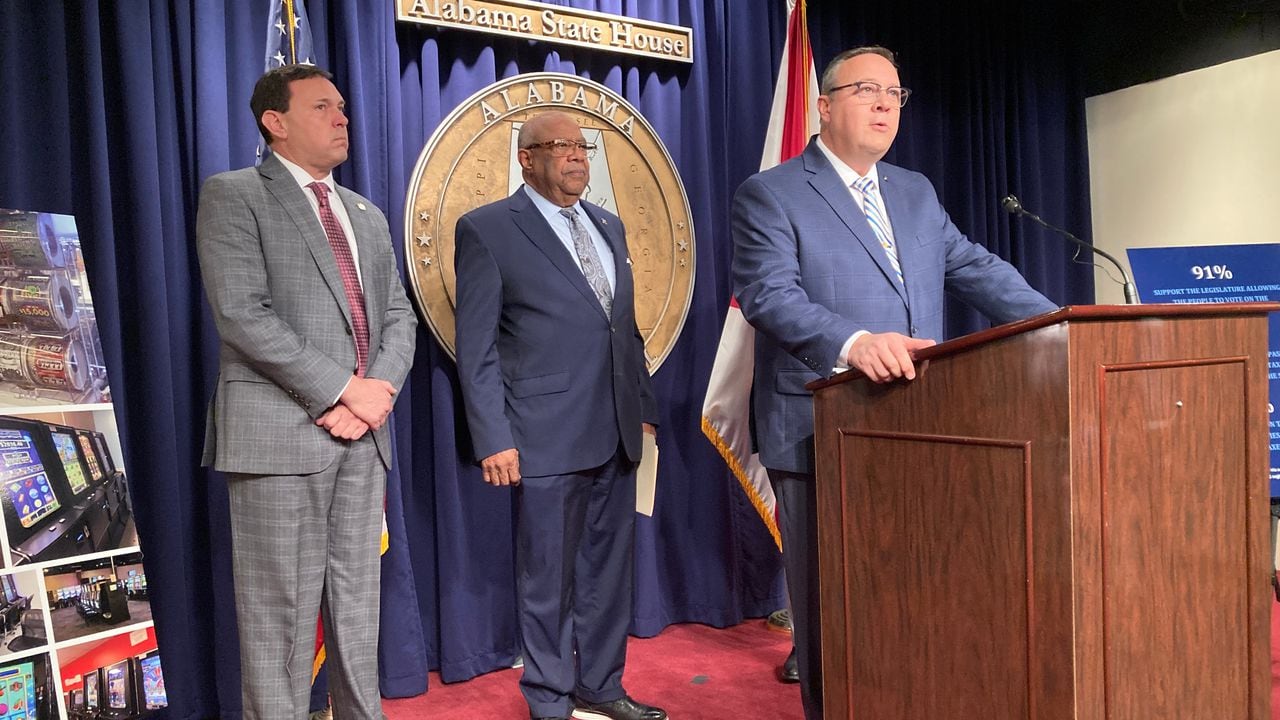Public hearing set for Tuesday on Alabama’s lottery, casinos bills
Legislation to let Alabama voters decide whether to approve a lottery, casinos, and legal sports betting will be discussed in a public hearing in the House of Representatives on Tuesday.
The Economic Development and Tourism Committee will hold the hearing at 3 p.m. in Room 200 of the Alabama State House.
To watch the live stream on Tuesday, go here and enter Room 200 in the select location box.
Reps. Chris Blackshear, R-Phenix City, and Andy Whitt, R-Madison, introduced the two-bill package last week. One bill is a constitutional amendment that would require approval by voters in November if it passes the Legislature.
Blackshear and Whitt were part of an ad hoc committee appointed by House Speaker Nathaniel Ledbetter, R-Rainsville to study gambling and how to regulate it. The legislation would create an Alabama Gaming Commission that would license and regulate the casinos.
The commission would consider bids for casinos in six locations – Birmingham, Mobile, Greene County, Houston County, Lowndes County, and Macon County. Four of those are locations that were home to greyhound tracks, while large bingo halls have operated in Houston and Lowndes counties.
The legislation would require Gov. Kay Ivey to enter negotiations for a compact with the Poarch Band of Creek Indians. If the state can reach an agreement with the tribe, it would be able to open a casino in northeast Alabama in addition to the three it has on tribal lands in Atmore, Wetumpka, and Montgomery. Overall, that means a possible total of 10 casinos.
The legislation would create an Alabama Lottery Corporation to oversee a state lottery that could include multi-state lotteries and instant, or scratch-off games.
The bills would would authorize sports betting at the casinos, as well as online and via mobile apps.
The Alabama Gaming Commission would include a law enforcement division to enforce gaming laws and regulations.
Lawmakers who introduced the bills said the package could raise an estimated $800 million to $1 billion in state revenue. The legislation says net revenue from the lottery would go to education purposes, while legislation from the casinos and sports betting would support a reserve fund for the state General Fund, health care, and other non-education purposes.
Read more: What’s in new lottery, casinos bill in Alabama Legislature?
Is Medicaid expansion buried in the Alabama gambling bill?
Approval of a constitutional amendment takes a three-fifths vote in the House and Senate. It will take votes from Republicans and Democrats to round up the 63 votes needed in the House.
House Minority Leader Anthony Daniels, D-Huntsville, said last week he thought reaction from the Democratic caucus was “pretty positive” but said it was too soon to say whether the caucus would support the plan overall.
Daniels said he wants the plan to include some benefit for retired educators because their pension benefits have not kept up with rising costs.
“Retired educators have given our state so much,” Daniels said. “And with the cost of everything going up, they’re operating in a different income class than they were when they were working.”
Daniels said some lawmakers are concerned about the impact on communities that have had bingo halls operating under local constitutional amendments, some of which have become important sources of jobs and revenue.
The legislation would repeal 17 local bingo amendments covering 16 counties — Calhoun, Covington, Etowah, Greene, Houston, Jefferson, Limestone, Lowndes, Macon, Madison, Mobile, Montgomery, Morgan, Russell, Walker, and Jasper.
Establishments operating under those amendments could continue until Jan. 1, 2027, but would have to follow certain requirements of the new Gaming Commission.
“There are concerns about some of the smaller facilities and them only being able to operate for a number of years,” Daniels said. “So they wanted to see some more permanent measures in place there. So those conversations are taking place.”
Republicans advocating for the legislation have said a main purpose is to bring uniformity to the state’s patchwork of gambling laws. The state Supreme Court has ruled electronic bingo is not allowed under the local amendments, but electronic bingo operations have continued to pop up despite the state’s enforcement efforts.
While there may still be disagreements about the legislation, Daniels said Ledbetter has kept a commitment to Democrats to be involved in developing it. He said that’s a change from three years ago, when a similar plan passed the Senate but died in the House because supporters could not round up 63 votes.
“He has been very open with our caucus having an opportunity to weigh in on the front end,” Daniels said. “And that’s something that we appreciate and something that we value because he’s a man of his word and he’s done that and it makes our members feel better about the process when you’re included on the front end, not just the back end.”
Rep. A.J. McCampbell, D-Demopolis, said last week he was undecided. McCampbell said it is important that Black investors and businesses have a stake in ownership of the casinos.
“Twenty-eight percent of the population in Alabama is Black, so at least 28% of the ownership needs to be housed within that community,” McCampbell said.
McCampbell said that while he expects the casinos to bring in jobs that will allow employees to support themselves, it will take more to build wealth in Black communities.
“That’s why ownership is important,” McCampbell said. “When you’re looking at the magnitude of dollars that are coming in, if all you’re doing is paying a group of people a wage out of that dollar, then it’s not creating wealth. So it’s important that everybody in the state has an opportunity to be lifted up by this if we’re all going to participate.”
